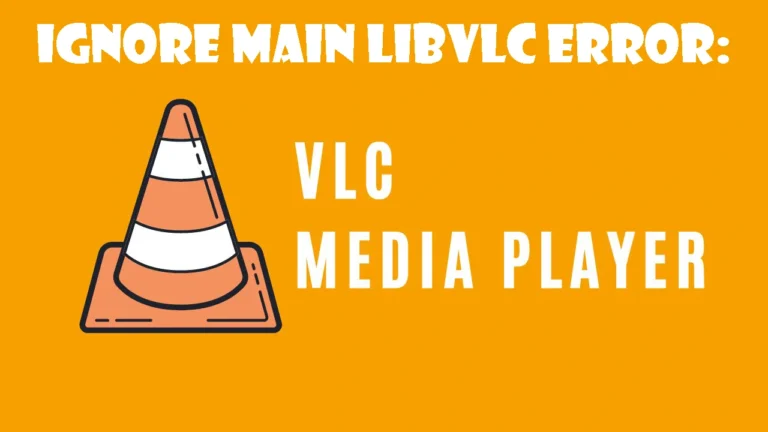Ignore main libVLC error: Practical Solutions for Developers” delves into essential strategies tailored specifically for developers who encounter the “ignore main libVLC error” message within their projects. In the realm of libVLC development, errors are bound to occur. However, mastering effective error management is pivotal to upholding the reliability and performance standards of multimedia applications. This comprehensive guide offers practical solutions to address and mitigate the challenges posed by the “ignore main libVLC error:” empowering developers to navigate through development hurdles seamlessly. By leveraging these strategies, developers can enhance the quality of their applications and streamline the development process for optimal results.
I. Ignore Main libVLC Error: Understanding the Challenge
When encountering the “Ignore Main libVLC Error:” developers face a perplexing challenge that demands comprehension. This error, stemming from the intricate architecture of libVLC, may arise due to various factors, including incompatible configurations or missing dependencies. Understanding the underlying mechanisms of libVLC and its error-handling processes is paramount in effectively addressing this issue.
Also Read: CroxyProxy YouTube
II. Addressing Ignore Main libVLC Error: Key Strategies
To tackle the “Ignore Main libVLC Error:” developers employ a repertoire of key strategies honed through experience and expertise. These strategies encompass meticulous debugging, thorough code review, and proactive error handling. Additionally, leveraging robust logging mechanisms and employing systematic testing methodologies prove instrumental in identifying and rectifying instances of this error.
III. Practical Approaches for Ignore Main libVLC Error:
Amidst the complexity of libVLC integration, developers rely on practical approaches to mitigate the “ignore main libVLC error:” These approaches encompass a meticulous examination of configuration settings, ensuring compatibility across platforms, and vigilant monitoring of error logs. By adopting a pragmatic stance and systematically addressing potential triggers, developers navigate through this error with efficacy.
IV. Developer’s Guide to Ignore Main libVLC Error:
In the developer’s guide to tackling the “ignore main libVLC error:” comprehensive insights and actionable advice abound. Armed with a deep understanding of libVLC’s architecture and error-handling mechanisms, developers embark on a journey of troubleshooting and resolution. This guide serves as a beacon, illuminating the path toward effective error management and ensuring seamless integration of libVLC within multimedia applications.
V. Solutions for Ignore Main libVLC Error:
As developers strive to resolve the “ignore main libVLC error:” an array of solutions emerges, each tailored to address specific facets of the challenge. From fine-tuning configuration parameters to updating dependencies and libraries, these solutions encompass a holistic approach to error resolution. By diligently implementing these solutions, developers pave the way for enhanced stability and reliability within their multimedia applications.
VI. Troubleshooting Ignore Main libVLC Error:
In the realm of troubleshooting the “ignore main libVLC error:” developers embark on a systematic journey of diagnosis and resolution. This process involves meticulous examination of error messages, thorough analysis of code implementation, and strategic utilization of debugging tools. By isolating root causes and tracing error pathways, developers unveil insights crucial for effective error remediation, thus ensuring the uninterrupted functionality of libVLC within multimedia applications.
VII. Optimizing Integration: Ignore Main libVLC Error:
Optimizing integration amidst the presence of the “ignore main libVLC error:” demands a multifaceted approach that prioritizes efficiency and reliability. Developers employ techniques such as modularization, dependency management, and version control to streamline integration processes. Additionally, thorough testing and validation procedures are implemented to fortify the integration against potential errors, ensuring seamless functionality across diverse environments.
VIII. Effective Management of Ignore Main libVLC Error:
Effective management of the “ignore main libVLC error:” necessitates proactive measures aimed at preempting and mitigating its occurrence. Developers establish robust error-handling mechanisms, incorporating graceful degradation and fallback strategies to minimize the impact of errors on application functionality. Furthermore, continuous monitoring and periodic audits ensure timely detection and resolution of any emerging instances of this error, thereby safeguarding the integrity of multimedia applications.
IX. Essential Toolkit for Ignore Main libVLC Error:
Within the arsenal of tools dedicated to addressing the “ignore main libVLC error:” developers wield a diverse array of resources tailored to facilitate efficient error resolution. This toolkit encompasses debugging utilities, logging frameworks, and diagnostic libraries, each serving a distinct role in the error-handling process. Leveraging these essential tools in tandem with comprehensive documentation and community support fosters a conducive environment for swift and effective resolution of libVLC errors.
X. Mastering Handling: Ignore Main libVLC Error:
Mastering the handling of the “ignore main libVLC error:” represents the pinnacle of developer proficiency in libVLC integration. Through diligent practice, continuous learning, and adaptation to evolving best practices, developers hone their skills in error diagnosis and resolution. Armed with a deep understanding of libVLC’s intricacies and a repertoire of effective strategies, developers ascend to mastery in handling the “ignore main libVLC error,” ensuring the seamless operation of multimedia applications across diverse environments.
XI. Some Errors and Solutions
Ø Error: “ignore main libVLC error:” message persists despite configuration adjustments.
Solution: Review configuration settings meticulously, ensuring compatibility with libVLC requirements. Double-check dependencies and library versions for compatibility.
Ø Error: “ignore main libVLC error:” occurs intermittently, hindering application stability.
Solution: Implement robust error-handling mechanisms within the application code to gracefully handle instances of the error. Utilize try-catch blocks or error-handling functions to capture and manage the error effectively.
Ø Error: “ignore main libVLC error:” arises due to outdated or incompatible libVLC installation.
Solution: Update libVLC to the latest stable version compatible with the application. Ensure proper installation and configuration following the recommended guidelines provided by the libVLC documentation.
Ø Error: “ignore main libVLC error:” triggers unexpected application crashes.
Solution: Conduct thorough debugging sessions to identify the specific code pathways leading to the error. Utilize debugging tools such as gdb or integrated development environment (IDE) debuggers to trace the error origins and implement necessary code fixes.
Ø Error: “ignore main libVLC error:” persists across different operating systems or platforms.
Solution: Perform comprehensive testing across various operating systems and platforms to identify any platform-specific issues causing the error. Adjust application code or configurations accordingly to ensure compatibility and consistent behavior across diverse environments.
Conclusion
In conclusion, addressing the “ignore main libVLC error:” requires a multifaceted approach encompassing understanding, troubleshooting, and proactive error management. Developers must leverage practical strategies, optimize integration processes, and master error-handling techniques to ensure the seamless operation of multimedia applications. By diligently implementing solutions tailored to the specific challenges posed by this error, developers can navigate through development hurdles with efficacy, ultimately delivering robust and reliable applications powered by libVLC.
FAQs About Ignore Main libVLC Error:
How common is the “ignore main libVLC error:” in multimedia application development?
The occurrence of the “ignore main libVLC error:” can vary depending on factors such as application complexity and libVLC configuration.
What are some common causes of the “ignore main libVLC error:”?
Common causes include incompatible configurations, outdated installations, and platform-specific issues.
Is there a universal solution to the “ignore main libVLC error:”?
No, the solution depends on the specific circumstances and root causes of the error.
How can I troubleshoot the “ignore main libVLC error” effectively?
Effective troubleshooting involves thorough debugging, reviewing configuration settings, and analyzing error logs.
Are there any preventative measures to mitigate the “ignore main libVLC error”?
Yes, proactive measures such as regular updates, thorough testing, and robust error handling can help mitigate the occurrence of this error.
Can the “ignore main libVLC error” lead to application instability?
Yes, if left unaddressed, the error can potentially lead to application crashes or instability.
Does the occurrence of the “ignore main libVLC error” vary across different operating systems?
Yes, the error may manifest differently across various operating systems due to differences in system configurations and dependencies.
Is there community support available for resolving the “ignore main libVLC error”?
Yes, forums, developer communities, and official documentation provide valuable resources for addressing this error.
Can improper handling of the “ignore main libVLC error” impact user experience?
Yes, improper handling may result in degraded performance or unexpected behavior, impacting the overall user experience.
How important is it to stay updated with the latest libVLC releases to prevent the “ignore main libVLC error”?
Staying updated with the latest releases ensures compatibility with the latest features and bug fixes, reducing the likelihood of encountering the error.






